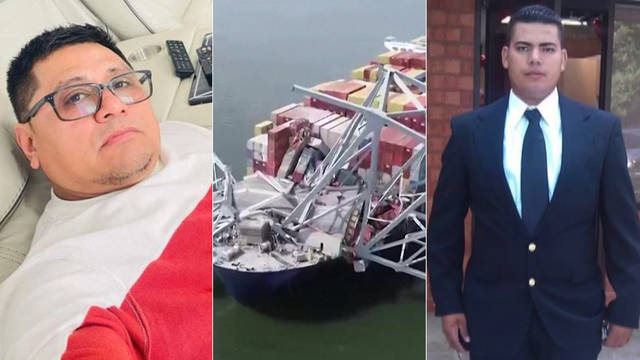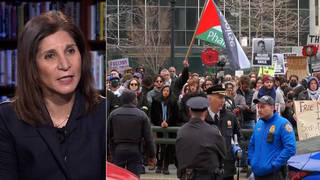
By Amy Goodman & Denis Moynihan
Immigrants helped build this country, a fact no amount of racism or xenophobia can erase. Immigrants, including children, work in fields and factories, driving our economy. A group of immigrant men were working late last Tuesday night, filling potholes on Baltimore’s Francis Scott Key Bridge. At 1:27 am, the Dali, a massive cargo vessel, 948 feet long and laden with roughly 4,700 shipping containers, lost power and rammed into the bridge, causing it to collapse. Two survived the disaster, six died. Only two of their bodies have been recovered from the cold, murky water of the Patapsco River.
Their tragic deaths occurred as increased immigrant arrivals are being exploited by Donald Trump and his rightwing extremist allies to foment division and to boost Trump’s presidential campaign. Just hours after the bridge collapse, Fox News host Maria Bartiromo, interviewing Florida Republican Senator Rick Scott, attempted to link the maritime disaster to immigrants at the U.S.’ southern border:
“I want to understand the threats or the potential threats that this country is facing right now given the wide open border, the fact that we don’t know who is in the country. The FBI is looking…to ensure there was no foul play.”
This is the same dog-whistle racism that Trump invoked in 2015, launching his first campaign: “When Mexico sends its people…They’re bringing drugs. They’re bringing crime. They’re rapists.” Trump continues his white supremacist ranting, saying at a recent Ohio campaign rally, “I don’t know if you call them people…These are animals and we have to stop it.”
Maximillian Alvarez, editor-in-chief of the Baltimore-based Real News Network, interviewed coworkers of the deceased. He said on the Democracy Now! news hour, “While we’re being talked about as like this invading horde that’s coming to destroy the country, what does this story actually show us? That immigrants are filling our potholes at night so that we can have a smooth drive to work in the morning.”
The six who died while working on the Key Bridge were hardworking men, from Mexico, Guatemala, Honduras and El Salvador.
Miguel Luna was a welder, a 49-year-old father and grandfather, a native of the Usulután Department in El Salvador, ravaged by the U.S.-backed Salvadoran military and paramilitaries in the 1980s. He played on the professional soccer team in the town of Berlin in his home region. His widow, Maria del Carmen, owns a food truck. Miguel was a beloved member of his community.
Miguel and another victim of the collapse, Maynor Suazo Sandoval, were members of CASA, an immigrant rights non-profit founded in 1986 to build solidarity with those impacted by the U.S.-backed violence in Central America. CASA wrote, “Maynor migrated from Honduras over 17 years ago, and he alongside his brother Carlos were active members in the activist committee of Owings Mills….Carlos said ‘He was always so full of joy, and brought so much humor to our family.’ He was a husband, and father of two.”
Details are still emerging of the other named victims, Alejandro Hernandez Fuentes, 35, of Mexico and Dorlian Ronial Castillo Cabrera, 26, of Guatemala. Their bodies were found inside a pickup truck, submerged in the river. Two more victims, also reportedly from Mexico and Guatemala, remain unnamed by their respective governments.
Millions of enslaved people also built this country, a point worth remembering as we mourn the immigrant laborers on the Key Bridge. The bridge was named after Francis Scott Key since, while watching the British navy bombard Fort McHenry in 1814, not far from where the bridge was built in the 1970s, Key wrote the poem that would become the national anthem. His poem has four stanzas, the first made famous as “The Star Spangled Banner.” Key was a slave owner, and denounced those who fled enslavement in 1814 to fight against the United States, for the British, who promised them freedom in return.
“No refuge could save the hireling and slave, From the terror of flight or the gloom of the grave,” Key wrote in his poem, words left out of the national anthem, but which nevertheless noticeably rhyme with “Land of the free and home of the brave.” This should be considered by those tasked with naming the replacement bridge.
The lives of Miguel and the five other workers have been cut short, but the hatred of immigrants, sadly, is alive, well and growing this election year. Pledges from President Biden to quickly open Baltimore’s port to commerce parallel campaign rhetoric on both sides to “shut down” the southern border to people seeking asylum.
“Immigrants like Miguel are building bridges to connect communities, not building walls to divide them,” CASA wrote, eulogizing Miguel Luna. Let those words inspire an embrace of immigrant communities, an anthem we can all rally around.











Media Options